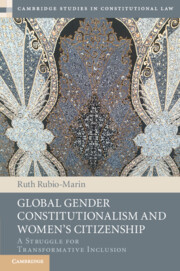Book contents
- Global Gender Constitutionalism and Women’s Citizenship
- Cambridge Studies in Constitutional Law
- Global Gender Constitutionalism and Women’s Citizenship
- Copyright page
- Dedication
- Contents
- Foreword
- Acknowledgments
- Table of Cases
- Introduction
- 1 The Constitutional Establishment of the Gender Order
- 2 Inclusive Constitutionalism and Its Limits
- 3 Participatory Constitutionalism
- 4 Transformative Gender Constitutionalism
- 5 Toward a Constitutional Gender Erasure or a Constitutional Gender Reaffirmation?
- Conclusion
- Index
1 - The Constitutional Establishment of the Gender Order
Revolutionary Times and Exclusionary Constitutionalism
Published online by Cambridge University Press: 29 September 2022
- Global Gender Constitutionalism and Women’s Citizenship
- Cambridge Studies in Constitutional Law
- Global Gender Constitutionalism and Women’s Citizenship
- Copyright page
- Dedication
- Contents
- Foreword
- Acknowledgments
- Table of Cases
- Introduction
- 1 The Constitutional Establishment of the Gender Order
- 2 Inclusive Constitutionalism and Its Limits
- 3 Participatory Constitutionalism
- 4 Transformative Gender Constitutionalism
- 5 Toward a Constitutional Gender Erasure or a Constitutional Gender Reaffirmation?
- Conclusion
- Index
Summary
The first constitutionalism was a gender exclusionary constitutionalism, which simply took a foundational gendered political order for granted, drawing from Enlightenment theories prevalent at the time. This chapter explains how the marital contract and the separate spheres tradition excluded women from the realm of equal citizenship rights despite constitutional appeals to the notion of equality. It shows how women were active in revolutionary moments and also seized to intervene in constitution-making from the very start and to advance various causes (e.g., temperance, female suffrage, abolitionism). The chapter then proceeds to show how women eventually conquered voting rights and the recognition of constitutional sex equality, along with provisions protecting motherhood and the family, first during interwar constitutionalism and then in post–World War II constitutionalism, and shows how none of this was sufficient to tackle the legacy of the separate spheres tradition, especially given the cultural hegemony of the breadwinner family model in the postwar years.
Keywords
- Type
- Chapter
- Information
- Global Gender Constitutionalism and Women's CitizenshipA Struggle for Transformative Inclusion, pp. 26 - 80Publisher: Cambridge University PressPrint publication year: 2022

